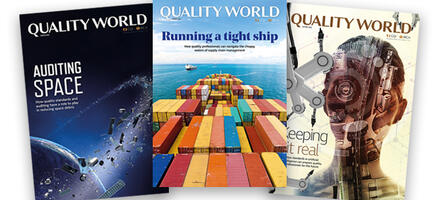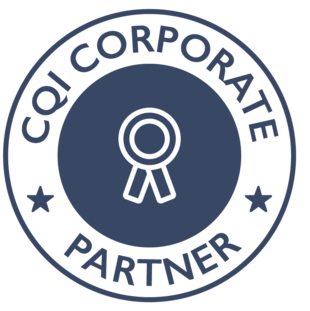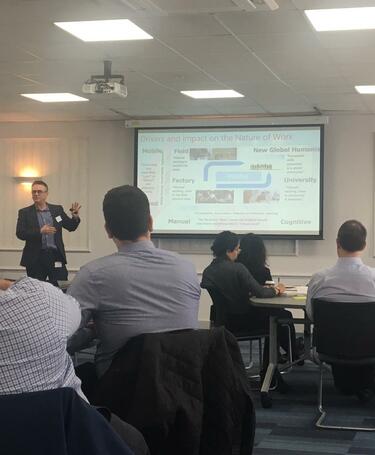
Adapting to change
Progress indicator
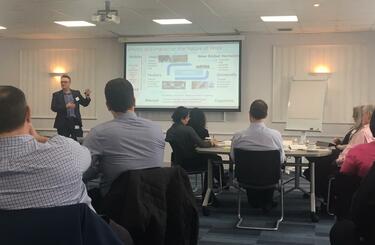
The latest exclusive event for CQI corporate partners, “The pace of change, new ways of working and the implications for quality and business improvement” took place on Thursday 4 April at De Vere Grand Connaught Rooms in London.
The event focused on the rapid pace of change and the need for organisations and their people to adapt.
Vincent Desmond, CEO at the CQI, commenced the discussion by asking attendees to look at a picture of a cartridge factory in Woolwich Arsenal during the First World War. Desmond told attendees the factory had made 170 million shell rounds during the war but there were some quality problems – 30% of those shell rounds were defective.
Attendees were then asked to look at the home page of a contemporary machine manufacturer which boasted a global business with customer driven solutions with excellent quality reliability and long-life. The organisation also highlighted their ISO 9001 certification to prove they’re not only focused on their products, but also on their services.
“At the CQI, we have identified four trends that have driven quality management over the past 100 years,” Desmond said. “Technology, globalisation, demographics and personal values. While these four trends will continue to drive society, they will also continue to drive the quality management discipline perhaps faster than ever before.”
Looking to the future
Martin Brenig-Jones, Managing Director, Catalyst Consulting, asked attendees if any of the following statements were familiar to them in the workplace:
- Frustration: you don’t seem to be able to do things easily
- Confusion: no-one really seems to know what’s going on
- Hassle: there are always fires to put out
- Overload: there is always too much to do
- Complaints: you’re spending too much time dealing with unhappy customers
- You have to reduce costs and do more with less
Attendees were advised that by changing the way we work, we can cope with frustrations and an accelerating pace of change.
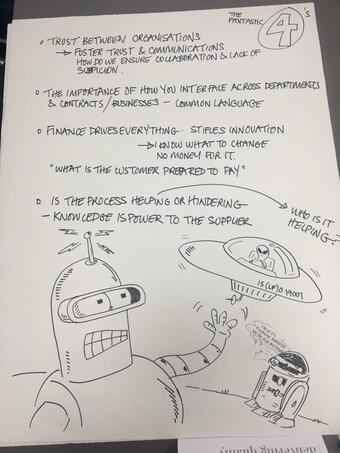
An image taken of one group's perspective on change management
“There is a lot of tension between the status quo and change,” Brenig-Jones said. “Looking to the future, quality needs to connect with market requirements. Catalyst uses the European Quality Award model for self-assessment and we have been working with the CQI to write the new guidance for ISO 9004:2018. We are proud to be associated with that. These holistic self-assessment models are powerful in showing you where your business is right now. However, you also need to look to the future. Link your self-assessment with all the intelligence you can obtain about the external world and work closely with your colleagues in marketing and strategy to bring about change.”
Brenig-Jones asked attendees to also look to Hoshin Kanri to ensure their organisation is working towards the same strategic goals. Quality professionals will need to be future-focused, they will need to challenge the status quo, adopt a holistic view, develop the change agenda and be the catalyst for revolution, he suggested.
Keeping up with technological growth
Mike Baddeley, Director of Innovation & Strategy at Ricoh UK spoke to attendees about the key changes Ricoh made to generate fundamental shifts in the organisation’s culture. The company introduced a new workspace that allowed for flexible working, many processes were digitised, and the culture was improved through better communication with employees, training and changes to existing policies.
“As a team, we had to adapt to new practices and challenge the culture of the organisation. We conducted research to determine what will happen in the future, how we can adapt, and how we can establish problem-solving solutions to bring about culture change,” Baddeley said.
Attendees were asked: “How do we keep up with what is happening in the world?” Baddeley said the biggest driver of change is technology and we have a responsibility to the people who work in our organisation to value their role in this culture shift.
A new way of working requires a new attitude and approach
“We are seeing a shift in leadership and culture – a new style is being developed,” Baddeley said. “The word ‘leadership’ for example, has taken over the word ‘management’. Diversity in the workplace is also important to having different mindsets when solving problems.”
Baddeley also told attendees about the benefits of Robotic Process Automation, the use of software with artificial intelligence and machine learning capabilities to handle repeatable tasks that were previously performed by humans. “I believe it’s our responsibility to educate ourselves,” he advised. “I’m already looking at what will be happening in the next three years within my team to help us drive change. We have to solve the problems we’re facing to adapt to the future.”
Final thoughts
Attending the event, Roxann Dawson, CQP MCQI, said: “Change comes from the heart of an organisation, with metamorphosis from within. Investment in your most valued asset is the key to maximising an organisation’s full benefits, your people.
“An organisation that faces constant demands to change and uses effective change management over and over with each new initiative may experience a fundamental shift in its operations. Organisations should develop skills to support employees through change and employees should see part of their job as navigating change.
“A new way of working requires a new attitude and approach. The new quality professional will see the ability to change as one of their primary responsibilities. They will understand and react with the understanding, perspectives, tools and techniques to make change seamless and effortless. Change will become business as usual.”
Quality World

Get the latest news, interviews and features on quality in our industry leading magazine.

